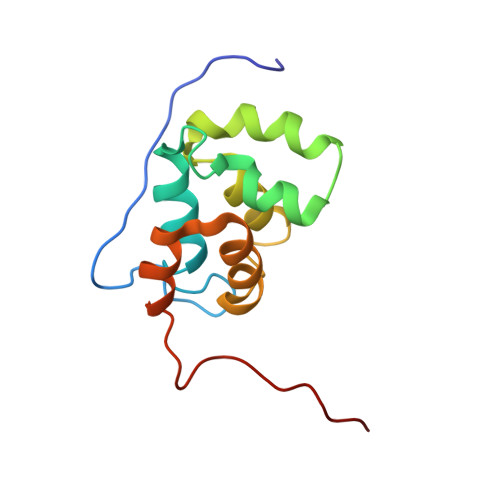The IL-33-PIN1-IRAK-M axis is critical for type 2 immunity in IL-33-induced allergic airway inflammation.
Nechama, M., Kwon, J., Wei, S., Kyi, A.T., Welner, R.S., Ben-Dov, I.Z., Arredouani, M.S., Asara, J.M., Chen, C.H., Tsai, C.Y., Nelson, K.F., Kobayashi, K.S., Israel, E., Zhou, X.Z., Nicholson, L.K., Lu, K.P.(2018) Nat Commun 9: 1603-1603
- PubMed: 29686383
- DOI: https://doi.org/10.1038/s41467-018-03886-6
- Primary Citation of Related Structures:
5UKE - PubMed Abstract:
Interleukin 33 (IL-33) is among the earliest-released cytokines in response to allergens that orchestrate type 2 immunity. The prolyl cis-trans isomerase PIN1 is known to induce cytokines for eosinophil survival and activation by stabilizing cytokines mRNAs, but the function of PIN1 in upstream signaling pathways in asthma is unknown. Here we show that interleukin receptor associated kinase M (IRAK-M) is a PIN1 target critical for IL-33 signaling in allergic asthma. NMR analysis and docking simulations suggest that PIN1 might regulate IRAK-M conformation and function in IL-33 signaling. Upon IL-33-induced airway inflammation, PIN1 is activated for binding with and isomerization of IRAK-M, resulting in IRAK-M nuclear translocation and induction of selected proinflammatory genes in dendritic cells. Thus, the IL-33-PIN1-IRAK-M is an axis critical for dendritic cell activation, type 2 immunity and IL-33 induced airway inflammation.
- Division of Translational Therapeutics, Department of Medicine and Cancer Research Institute, Beth Israel Deaconess Medical Center, Harvard Medical School, Boston, MA, 02215, USA.
Organizational Affiliation:
















